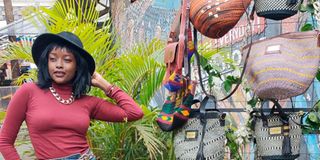T5 interview with Sheila Atieno

What you need to know:
- I've learnt that I prefer working with colours and patterns rather than graphs and numbers.
- It also made me embrace my femininity after working for long in environments that forced me to think and act like a man.
- Also, because Okapu is a channel of self-expression, I had to spend time with myself and seek to understand who I am, where I come from, and where I want to go.
Sheila Atieno, a trained engineer, is the founder and designer of Okapu, a company that makes customised Africa-inspired woven bags. She says she did not start Okapu - Okapu found her, and led her on a journey of not only discovering her true self, but also the power that lies in an empowered woman
1. How was it being an engineer while suppressing your creativity? What made you get into engineering?
When I was choosing what course to study in university, my main priority was making sure I had a high chance of securing a job after my studies. I did well in physics, so engineering felt like an obvious choice. Engineering is a very linear practice, heavy on analysis but with limited room for imagination. This means you use more of your left brain because everything has to be factual and logical. It is only later that I realised that I was actually a very visual and creative person, with strong right-brain attributes that I was not exploring at all as an engineer.
2. What did you discover about yourself while working on Okapu?
That I prefer working with colours and patterns rather than graphs and numbers. It also made me embrace my femininity after working for long in environments that forced me to think and act like a man. Also, because Okapu is a channel of self-expression, I had to spend time with myself and seek to understand who I am, where I come from, and where I want to go.
3. Where does the name Okapu come from? And what inspires your designs? What's your favourite one?
In my Luo community, our grandmothers refer to baskets and handbags as okapus, which is a corrupted version of kikapu, which is the Kiswahili word for basket. My designs are based on the traditional kiondo bag, made by the Akamba, but which is used all over Kenya. I started the business by reselling kiondos, then I started making my own remakes and designs. I love all my products, but I am most proud of our bucket bags.
4. How hard is it for a young person in Nairobi to start a business? What are the pitfalls?
Currently, with the technology we have, it is not difficult to start out. There is a lot of information on the internet. I knew nothing about the handicraft business when I first started but I have learnt a lot from the internet for free. It is also a lot easier to reach customers, thanks to social media. I think the difficult part is deciding what business to start and sticking to it through the challenges. If it is not driven by passion, it will feel harder than it is. I've also noticed that many lack the confidence to start even when they know what they would like to trade in. They doubt themselves.
5. How have you dealt with the challenges brought about by Covid-19? What do you tell yourself when you feel hopeless?
When Covid-19 struck, I was obviously worried, and even though our sales dipped for a while, I took it as an opportunity to learn. A lot of organisations were offering free online courses and webinars. This impacted my business positively because I applied new lessons and eventually realised growth. These days, whenever I feel down, I recite my affirmations and indulge in things that bring me joy, like watching my favorite shows. Sometimes the mind just needs a break before it can give you the answer you need.





